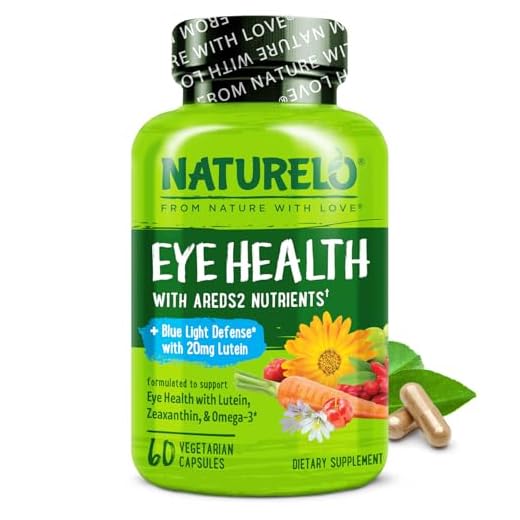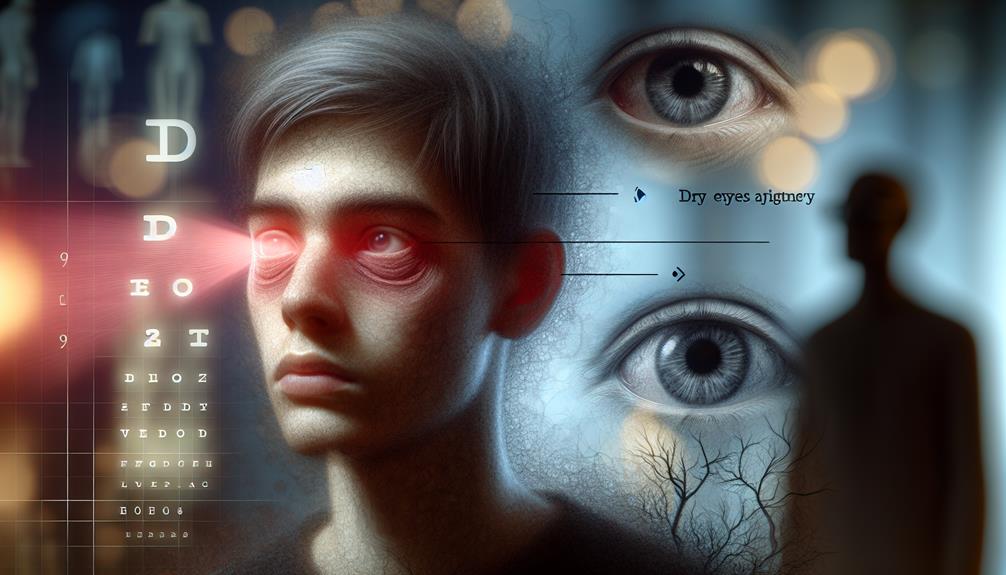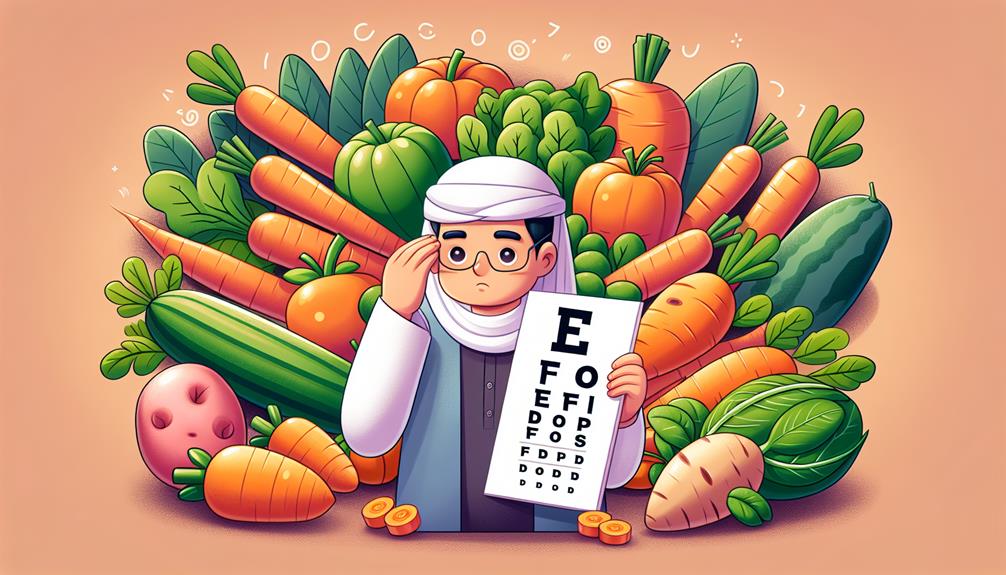







A deficiency in Vitamin A can affect your vision by leading to night blindness and difficulties in seeing in low-light conditions. Vitamin A is vital for maintaining healthy photoreceptors in the retina and for producing rhodopsin, a key component for low-light vision. Without enough Vitamin A, your eyes may struggle to adjust to changes in light intensity and may experience issues like dryness and ulcers. Ensuring adequate levels of Vitamin A is essential for optimal eye health. Understanding the impact of Vitamin A deficiency on your vision can help you make informed choices for maintaining good eye health.
Key Takeaways
- Vitamin A deficiency can cause night blindness and impact low-light vision.
- Inadequate Vitamin A levels lead to dry eyes and compromised cornea health.
- Deficiency results in irreversible vision impairment and systemic health risks.
- Vitamin A supports photoreceptors in the retina crucial for vision.
- Including Vitamin A-rich foods or supplements can prevent vision problems.
Importance of Vitamin a for Vision
Vitamin A plays a vital role in maintaining excellent vision by supporting the function of photoreceptor cells in the retina. This essential vitamin is critical for eyesight improvement as it is a key component of rhodopsin, a protein in the retina that helps you see in low-light conditions. Without sufficient levels of vitamin A, your vision can deteriorate, leading to night blindness and eventually more severe visual impairments.
The importance of vitamin A for vision cannot be overstated. It is involved in the process of converting light into electrical signals that the brain interprets as vision. Additionally, vitamin A helps maintain the clear, moist surface of the eye known as the cornea, which is essential for good eyesight. Ensuring an adequate intake of vitamin A through your diet or supplements is crucial for maintaining optimal vision health and preventing vision problems associated with deficiency. Remember, your eyes rely on vitamin A to function properly and support your ability to see clearly.
Role of Vitamin a in Low-Light Conditions
In low-light conditions, the role of vitamin A becomes important for facilitating top visual function. Vitamin A is vital for maintaining best night vision, which is the ability to see in low-light environments. This is because in dim light, the eye relies on specialized cells in the retina called rods to detect light. These rods contain a photopigment called rhodopsin, which is composed of a protein called opsin and a molecule derived from vitamin A known as retinal. When light enters the eye, retinal undergoes a chemical reaction that triggers nerve impulses to the brain, allowing us to perceive images in low-light settings.
Furthermore, vitamin A plays a key role in regulating light sensitivity. It helps the eye adjust to changes in light intensity, allowing for smooth changes between well-lit and dimly-lit environments. Without sufficient vitamin A, the eye struggles to adapt to low-light conditions, leading to decreased night vision and increased light sensitivity, where even normal levels of light can appear too bright. Ensuring an adequate intake of vitamin A is essential for maintaining best vision, particularly in low-light settings.
Symptoms of Vitamin a Deficiency

Insufficient intake of vitamin A can manifest through various visual and non-visual symptoms, indicating a deficiency that requires prompt attention. When it comes to eye health, a deficiency in vitamin A can lead to night blindness, where individuals may struggle to see in low-light conditions. This occurs because vitamin A is essential for the production of rhodopsin, a pigment in the eyes that helps with night vision. In addition to night blindness, dry eyes can also be a symptom of vitamin A deficiency. The lack of this key nutrient can affect the production of tears, leading to discomfort and potential damage to the cornea.
Beyond eye-related symptoms, a deficiency in vitamin A can also manifest in non-visual ways. For instance, skin issues like dry skin or follicular hyperkeratosis, where hair follicles produce excessive keratin, can occur. Furthermore, impaired immune function and an increased susceptibility to infections are common consequences of this nutrient deficiency. Recognizing these signs early on is crucial to addressing the underlying nutrient deficiency and preventing further complications.
Impact of Deficiency on Vision
A deficient intake of vitamin A can greatly impact your vision, leading to a variety of visual impairments that can affect daily activities and overall eye health. Vitamin A plays an essential role in maintaining the health of your eyes, specifically the retina, which is vital for converting light into signals that are interpreted by the brain. When there is a deficiency in vitamin A, your eyes may struggle to adjust to changes in light, leading to night blindness or difficulty seeing in dimly lit environments. Additionally, a lack of vitamin A can result in a condition known as xerophthalmia, which causes dryness of the eyes, ulcers, and in severe cases, even blindness. Besides, vitamin A deficiency can compromise the integrity of the cornea, making it more susceptible to infections and leading to further visual impairments. Ensuring an adequate intake of vitamin A is essential for maintaining ideal eye health and preventing visual impairments.
Link Between Diet and Eyesight

Investigating the connection between dietary habits and eyesight uncovers essential insights into maintaining excellent visual health. Your dietary choices play a critical role in supporting ideal eye health. Consuming a well-balanced diet rich in necessary nutrients is key to preserving your vision. Proper nutrition is essential for maintaining good visual acuity. Certain nutrients, such as Vitamin A, are particularly important for eye health. Including foods like carrots, spinach, and sweet potatoes in your diet can provide the necessary Vitamin A to support your vision. Omega-3 fatty acids found in fish like salmon and walnuts are also beneficial for eye health. Additionally, antioxidants present in fruits and vegetables help protect your eyes from damage caused by free radicals. By making mindful nutrition choices, you can help safeguard your eyesight and promote overall eye health. Remember, a healthy diet not only benefits your body but also contributes significantly to maintaining clear and sharp vision.
Prevention of Vitamin a Deficiency
To prevent Vitamin A deficiency, ensuring a diet rich in foods like carrots, spinach, and sweet potatoes is essential for maintaining excellent vision health. These foods are high in beta-carotene, a precursor to Vitamin A, which is vital for eye health. Nutrition education plays a key role in preventing deficiencies by raising awareness about the importance of including Vitamin A-rich foods in daily meals.
Eye health promotion programs often emphasize the importance of a well-balanced diet that includes a variety of fruits and vegetables to prevent deficiencies and maintain top-notch vision. Encouraging individuals to consume foods rich in Vitamin A can greatly reduce the risk of developing eye problems associated with deficiency, such as night blindness or xerophthalmia. Additionally, promoting the consumption of fortified foods or supplements can be beneficial in populations where access to Vitamin A-rich foods is limited.
Treatment Options for Deficiency

Addressing Vitamin A deficiency typically involves supplementation with oral Vitamin A capsules to restore adequate levels in the body. Dietary supplements are the primary treatment option for individuals with this deficiency. Best dosages of Vitamin A supplementation vary depending on the severity of the deficiency and should be determined by a healthcare provider. It is essential to follow the recommended dosage to avoid toxicity, as excessive Vitamin A intake can lead to adverse effects such as liver damage, bone abnormalities, and blurred vision.
Alternative therapies, such as increasing the intake of Vitamin A-rich foods like liver, fish oils, and dairy products, can also help in conjunction with supplements. However, these alone may not provide sufficient amounts of Vitamin A to address a severe deficiency promptly. Monitoring Vitamin A levels through blood tests is important to adjust supplementation accurately.
While Vitamin A supplementation is an effective treatment for deficiency, it is important to be aware of potential side effects and consult a healthcare provider before starting any new supplement regimen.
Risks of Prolonged Deficiency
Prolonged Vitamin A deficiency poses significant risks to ocular health, potentially leading to irreversible vision impairment. Long term consequences of inadequate Vitamin A levels include a condition known as xerophthalmia, which manifests as dryness of the conjunctiva and cornea. Without proper intervention, this can progress to more severe complications such as corneal ulcers, scarring, and even blindness. Vitamin A is essential for the maintenance of healthy photoreceptors in the retina, and its deficiency can disrupt the process of vision signal transduction, impacting overall visual acuity.
Potential complications of prolonged Vitamin A deficiency extend beyond ocular health. Systemic effects may arise, affecting epithelial tissues in various organs, leading to increased susceptibility to infections. Moreover, Vitamin A plays a crucial role in immune function, and its deficiency can compromise the body's ability to combat pathogens effectively. As a result, ensuring an adequate intake of Vitamin A is critical for maintaining not only ocular health but overall well-being.
Connection to Night Blindness

How does Vitamin A deficiency specifically relate to the occurrence of night blindness? Night blindness, a condition where individuals have difficulty seeing in low light conditions or at night, is closely linked to a lack of Vitamin A in the diet. Vitamin A is essential for the production of rhodopsin, a pigment in the retina that helps eyes adjust to dim light. When there is a deficiency in Vitamin A, the levels of rhodopsin decrease, leading to impaired night vision.
Individuals with a deficiency in Vitamin A may experience a progressive decline in their ability to see in low light environments. This happens because without enough Vitamin A, the regeneration of rhodopsin is impaired, affecting the eye's ability to adapt to changes in light intensity. As a result, those with a Vitamin A deficiency may find it challenging to drive at night, move around in dimly lit areas, or engage in activities that require good night vision.
To prevent night blindness and other vision problems associated with Vitamin A deficiency, it is important to include Vitamin A-rich foods such as carrots, sweet potatoes, spinach, and liver in your diet. If you suspect a deficiency, consult a healthcare provider for appropriate management and supplementation.
Vision Improvement Through Vitamin a
Improving vision through Vitamin A supplementation has been shown to be effective in addressing deficiencies that impact visual acuity and overall eye health. Vitamin A plays a vital role in maintaining proper eye function and health. It is essential for the formation of rhodopsin, a pigment in the retina that helps with low-light vision. By guaranteeing an adequate intake of Vitamin A, individuals can support their eye health and potentially improve their vision.
Vitamin A's nutritional benefits extend beyond just vision. It is a powerful antioxidant that helps protect the eyes from damage caused by free radicals. Additionally, Vitamin A supports the health of the cornea and other parts of the eye. Adequate levels of Vitamin A in the diet can help prevent conditions like dry eyes and night blindness.
Incorporating Vitamin A-rich foods such as carrots, sweet potatoes, spinach, and liver into your diet can contribute to maintaining good eye health and potentially improving your vision. However, it is important to consult with a healthcare provider before starting any supplementation to make sure it is appropriate for your specific needs.






